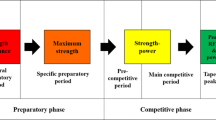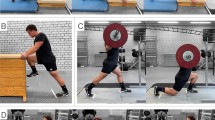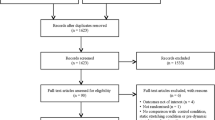Abstract
This study examined the associations between the fluctuations of foot acceleration during shortening and lengthening contractions with the electromyographic (EMG) activity of lower leg muscles and ultrasound measures of tibialis anterior fascicle length and pennation angle. Young (24.9 ± 4.17 years) and old (74.8 ± 3.31 years) adults lifted and lowered a submaximal load with the foot at different speeds (3°/s–50°/s). The standard deviation (SD) of foot acceleration normalized to the load lifted was similar for young (12.2 ± 7.22 cm s−2/kg) and old adults (14.3 ± 8.03 cm s−2/kg; P = 0.093). The changes in tibialis anterior muscle fascicle length and pennation angle were similar for young and old adults (P ≥ 0.233), but greater for shortening (fascicle length: 0.937 ± 0.633 cm, pennation angle: 1.61 ± 0.918º) than for lengthening contractions (fascicle length: 0.806 ± 0.521 cm, pennation angle: 0.966 ± 0.632º; P ≤ 0.014). The changes in fascicle length and pennation angle were not associated with the SD of foot acceleration (r 2 ≤ 0.031; P ≥ 0.092). The surface EMG of tibialis anterior was greater for the shortening contractions than for the lengthening contractions (P < 0.001), but triceps surae EMG was similar for the two types of contractions (P = 0.304). The results suggested that the influence of movement speed on variability in performance was similar for shortening and lengthening contractions with the dorsiflexor muscles; furthermore, old adults were able to match the performance of young adults.





Similar content being viewed by others
References
Barry BK, Pascoe MA, Jesunathadas M, Enoka RM (2007) Rate coding is compressed but variability is unaltered for motor units in a hand muscle of old adults. J Neurophysiol 97:3206–3218
Bazzucchi I, Felici F, Macaluso A, De Vito G (2004) Differences between young and older women in maximal force, force fluctuations, and surface EMG during isometric knee extension and elbow flexion. Muscle Nerve 30:626–635
Burnett RA, Laidlaw DH, Enoka RM (2000) Coactivation of the antagonist muscle does not covary with steadiness in old adults. J Appl Physiol 89:61–71
Carville SF, Perry MC, Rutherford OM, Smith ICH, Newham DJ (2007) Steadiness of quadriceps contractions in young and older adults with and without a history of falling. Eur J Appl Physiol 100:527–533
Cavagna GA, Kaneko M (1977) Mechanical work and efficiency in level walking and running. J Physiol 268:467–481
Christou EA, Carlton LG (2002a) Age and contraction type influence motor output variability in rapid discrete tasks. J Appl Physiol 93:489–498
Christou EA, Carlton LG (2002b) Motor output is more variable during eccentric compared with concentric contractions. Med Sci Sports Exerc 34:1773–1778
Christou EA, Carlton LG (2002c) Old adults exhibit greater motor output variability than young adults only during rapid discrete isometric contractions. J Gerontol 56A:B524–B532
Christou EA, Enoka RM (2010) Aging and movement errors when lifting and lowering light loads. Age (in revision)
Christou EA, Shinohara M, Enoka RM (2003) Fluctuations in acceleration during voluntary contractions lead to greater impairment of movement accuracy in old adults. J Appl Physiol 95:373–384
Christou EA, Poston B, Enoka JA, Enoka RM (2007) Different neural adjustments improve endpoint accuracy with practice in young and old adults. J Neurophysiol 97:3340–3350
Dey DK, Bosaeus I, Lissner L, Steen B (2009) Changes in body composition and its relation to muscle strength in 75-year-old men and women: a 5-year prospective follow-up study of the NORA cohort in Götegberg, Sweden. Nutrition 25:613–619
Elias NJ, Bryden MP, Bulman-Fleming MB (1998) Footedness is a better predictor than is handedness of emotional lateralization. Neuropsychologia 36:37–43
Forrest KY, Zmuda JM, Cauley JA (2007) Patterns and correlates of muscle strength loss in older women. Gerontology 53:40–47
Fukunaga T, Ichinose Y, Ito M, Kawakami Y, Fukashiro S (1997) Determination of fascicle length and pennation in a contracting human muscle in vivo. J Appl Physiol 82:354–358
Fukunaga T, Kubo K, Kawakami Y, Fukashiro S, Kanehisa H, Maganaris CN (2001) In vivo behaviour of human muscle tendon during walking. Proc R Soc Lond B Biol Sci 268:229–233
Goodpaster BH, Park SW, Harris TB, Kritchevsky SB, Nevitt M, Schwartz AV, Simonsick EM, Tylvasky FA, Visser M, Newman AB (2006) The loss of skeletal muscle strength, mass, and quality in older adults: the health, aging and body composition study. J Gerontol 61A:1059–1064
Graves AE, Kornatz KW, Enoka RM (2000) Older adults use a unique strategy to lift inertial loads with the elbow flexor muscles. J Neurophysiol 83:2030–2039
Hamilton AF, Jones KE, Wolpert DM (2004) The scaling of motor noise with muscle strength and motor unit number in humans. Exp Brain Res 157:417–430
Hortobagyi T, Tunnel D, Moody J, Beam S, DeVita P (2001) Low- or high-intensity strength training partially restores impaired quadriceps force accuracy and steadiness in aged adults. J Gerentol Biol Sci 56A:1138–1147
Ishikawa M, Komi PV, Grey MJ, Lepola V, Brüggemann GP (2005) Muscle–tendon interaction and elastic energy usage in human walking. J Appl Physiol 99:603–608
Jesunathadas M, Klass M, Duchateau J, Enoka RM (2008) Motor unit discharge during steady isometric contractions with the dorsiflexor muscles. North American Congress on Biomechanics (American Society of Biomechanics), Ann Arbor, MI
Kawakami Y, Kubo K, Kanehisa H, Fukunaga T (2002) Effect of series elasticity on isokinetic torque–angle relationship in humans. Eur J Appl Physiol 87:381–387
Keen A, Yue GH, Enoka RM (1994) Training-related enhancement in the control of motor output in elderly humans. J Appl Physiol 77:2648–2658
Klass M, Baudry S, Duchateau J (2008) Age-related decline in rate of torque development is accompanied by lower maximal motor unit discharge frequency during fast contractions. J Appl Physiol 104:739–746
Kornatz KW, Christou EA, Enoka RM (2005) Practice reduces motor unit discharge variability in a hand muscle and improves manual dexterity in old adults. J Appl Physiol 98:2072–2080
Laidlaw DH, Bilodeau M, Enoka RM (2000) Steadiness is reduced and motor unit discharge is more variable in old adults. Muscle Nerve 23:600–612
Laidlaw DH, Hunter SK, Enoka RM (2002) Nonuniform activation of the agonist muscle does not covary with index finger acceleration in old adults. J Appl Physiol 93:1400–1410
Lexell J, Taylor CC, Sjostrom M (1988) What is the cause of the ageing atrophy? Total number, size and proportion of the different fiber types studied in whole vastus lateralis muscle from 15- to 83-year-old men. J Neurol Sci 84:275–294
Maganaris CN (2001) Force-length characteristics of in vivo human skeletal muscle. Acta Physiol Scand 172:279–285
Maganaris CN, Baltzopoulos V, Sargeant AJ (1998) In vivo measurements of the triceps surae complex architecture in man: implications for muscle function. J Physiol 512:603–614
Marmon AR, Pascoe MA, Enoka RM (2008). Associations between force steadiness and tests of hand function across the adult life span. Soc Neurosci Abstr Washington, DC #145.16/V31
Moritz CT, Barry BK, Pascoe MA, Enoka RM (2005) Discharge rate variability influences the variation in force fluctuations across the working range of a hand muscle. J Neurophysiol 93:2449–2459
Nakagawa Y, Hayashi K, Yamamoto N (1996) Age-related changes in biomechanical properties of the Achilles tendon in rabbits. Eur J Appl Physiol 73:7–10
Narici MV, Maffiuli N (2010) Sarcopenia: characteristics, mechanisms and functional significance. Br Med Bull (in press)
Narici MV, Maganaris CN (2006) Adaptability of elderly human muscles and tendons to increased loading. J Anat 208:433–443
Narici MV, Maganaris CN, Reeves ND, Capodaglio P (2003) Effect of aging on human muscle architecture. J Appl Physiol 95:2229–2234
Ofori E, Samson JM, Sosnoff JJ (2010) Age-related differences in force variability and visual display. Exp Brain Res 203:299–306
Pasquet B, Carpentier A, Duchateau J (2006) Specific modulation of motor unit discharge for a similar change in fascicle length during shortening and lengthening contractions in humans. J Physiol 577:753–765
Poston B, Enoka JA, Enoka RM (2008a) Endpoint accuracy for a small and a large hand muscle in young and old adults during rapid, goal-directed isometric contractions. Exp Brain Res 187:373–385
Poston B, Enoka JA, Enoka RM (2008b) Practice and endpoint accuracy with the left and right hands of old adults: the right-hemisphere aging model. Muscle Nerve 37:376–386
Reeves ND, Narici MV (2003) Behavior of human muscle fascicles during shortening and lengthening contractions in vivo. J Appl Physiol 95:1090–1096
Rudroff T, Jesunathadas M, Gibb J, Enoka RM (2009) The association between fluctuations in foot acceleration and muscle architecture of the tibialis anterior. Soc Neurocsci Abstr Chicago, IL #179.16/BB37
Semmler JG (2002) Motor unit synchronization and neuromuscular performance. Exerc Sport Sci Rev 30:8–14
Semmler JG, Steege JW, Kornatz KW, Enoka RM (2000) Motor-unit synchronization is not responsible for larger motor-unit forces in old adults. J Neurophysiol 84:358–366
Seynnes O, Hue OA, Garrandes F, Colson SS, Bernard PL, Legros P, Fiatarone Singh MA (2005) Force steadiness in the lower extremities as an independent predictor of functional performance in older women. J Aging Phys Act 13:395–408
Sosnoff JJ, Voudrie SJ (2009) Practice and age-related loss of adaptability in sensorimotor performance. J Motor Behav 41:137–145
Spanjaard M, Reeves ND, van Dieën JH, Baltzopoulos V, Maganaris CN (2009) Influence of gait velocity on gastrocnemius muscle fascicle behaviour during stair negotiation. J Electromyogr Kinesiol 19:304–313
Thom JM, Morse CI, Birch KM, Narici MV (2007) Influence of muscle architecture on the torque and power-velocity characteristics of young and elderly men. Eur J Appl Physiol 100:613–619
Tracy BL (2007) Force control is impaired in the ankle plantarflexors of elderly adults. Eur J Appl Physiol 101:629–636
Tracy BL, Enoka RM (2002) Older adults are less steady during submaximal isometric contractions with the knee extensor muscles. J Appl Physiol 92:1004–1012
Tracy BL, Enoka RM (2006) Steadiness training with light loads in the knee extensors of elderly adults. Med Sci Sport Exerc 38:735–745
Tracy BL, Dinenno DV, Jorgensen B, Welsh SJ (2007) Aging, visuomotor correction, and force fluctuations in large muscles. Med Sci Sports Exerc 39:469–479
Vaillancourt DE, Sosnoff JJ, Newell KM (2004) Age-related changes in complexity depend on task dynamics. J Appl Physiol 97:454–455
Yamauchi J, Mishima C, Nakayama S, Ishii N (2009) Force–velocity, force–power relationships of bilateral and unilateral leg multi-joint movements in young and elderly women. J Biomech 42:2151–2157
Acknowledgments
The authors thank Joel A. Enoka, James M. Gibb, and Diba Mani for their assistance with the experimental design and testing sessions. National Institute of Health Grants R01AG09000 and MO1RR000051.
Author information
Authors and Affiliations
Corresponding author
Additional information
Communicated by Arnold de Haan.
Rights and permissions
About this article
Cite this article
Jesunathadas, M., Rudroff, T. & Enoka, R.M. Changes in muscle fascicles of tibialis anterior during anisometric contractions are not associated with motor-output variability of the ankle dorsiflexors in young and old adults. Eur J Appl Physiol 110, 1175–1186 (2010). https://doi.org/10.1007/s00421-010-1606-4
Accepted:
Published:
Issue Date:
DOI: https://doi.org/10.1007/s00421-010-1606-4




